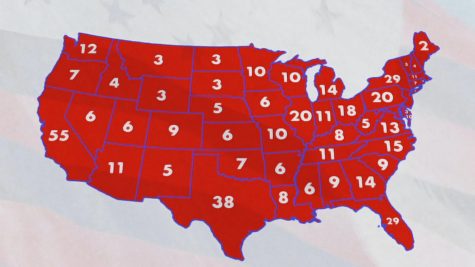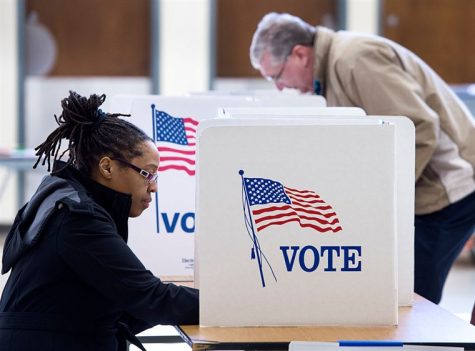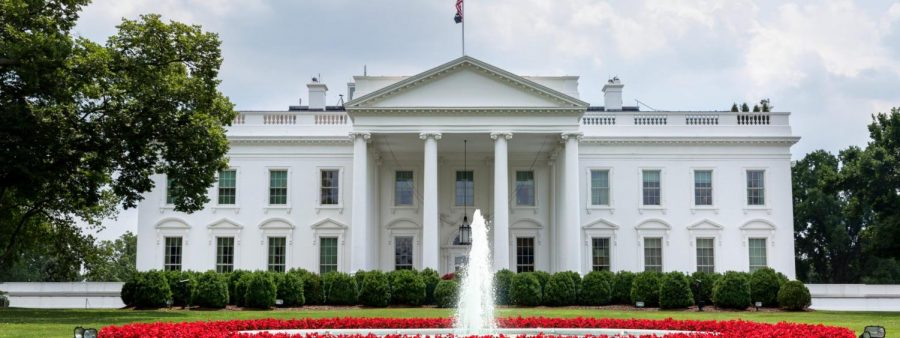Opinion: Should The United States Abolish The Electoral College?

The United States is unique in the way it selects the president and vice president every four years because it uses a system known as the Electoral College. On election day, citizens head to the polls and vote for their preferred candidate. The votes are counted, and the total number counted for each candidate is known as the popular vote. The United States does not operate under only these conditions; instead, the popular votes determine how the 538 electors cast their votes for President and Vice President. Whichever candidate wins the popular vote for the state gets all of the electors’ votes, so they are directly related. The number of electors determined for each state is based on the state’s population. If a state has a larger population, they have more electoral votes. (see map for each state’s electoral votes). The presidential candidate that receives 270 or more electoral votes wins the election and enters the Oval Office the following January. It should be noted that Maine and Nebraska have implemented a “district” system in which two at-large electors vote for the state’s popular plurality and one elector votes for each congressional district’s popular plurality.
At the time of the creation of the United States Constitution, there was a great distrust in the executive power so the creators of the Constitution felt that voting should fall in the hands of the people. However, there were two groups of delegates that had opposing ideas of how to vote in the new democracy. One group of delegates felt that Congress should have no say in voting because it leaves room for corruption between the executive and legislative branches. The other group was against the popular vote because they felt voters lacked the information/education to choose a leader; they also felt a popular vote could lead to “mob mentality.” To compromise between these two groups, the framers decided that the voters would elect delegates to cast the actual ballots for president, leading to the establishment of the Electoral College.
The Electoral College so enshrined into our system has some benefits to the functionality of our democracy. This process puts the votes in the hands of the electors who arguably have the information necessary to make the best decision. Though social media and the Internet gives citizens access to political information, not all the information is accurate.
With the Electoral College, the interest of states with smaller populations are protected. If the election was dependent on the popular vote, candidates would only campaign in larger regions and cities. Since the Electoral College requires votes from multiple regions, candidates will create a campaign and a platform with a national focus, serving the needs of the entire nation.

On the other hand, there are some downfalls to our current system. With the development of modern technology, voters are now able to get the necessary information to make the most informed decisions possible that was not planned by the Founding Fathers. Though there is inaccurate information on social media and other news sites, citizens have both the responsibility and the right to fact-check with reliable sources. The access to valid and trustworthy information may be difficult to find with the assortment of misinformation on the Internet, but it is still available to those willing to find it. The Founding Fathers could not imagine this society of mass-information and the Internet.
It is not uncommon for the Constitution to be amended and modified to adjust to the progressing times (women’s right to vote, abolishing slavery, etc.) The Electoral College puts the power of the election to the “swing states”; presidential candidates can skew their positions on issues to get more votes from particular states. There have been five United States presidents (John Quincy Adams, Rutherford B.Hayes, Benjamin Harrison, George W.Bush, and Donald Trump) that have lost the popular vote and won the Electoral College, proving the system has its flaws when it comes to representing the people’s voice.
Taking all of this information into consideration, I think the Electoral College should be abolished. Voting is the foundation of a democracy so it is of the utmost importance that we preserve it. The Electoral College takes away from this importance. Presidential votes are the voice of the people. We get to decide who enforces the laws and leads the nation. Without this power being at the center of our country, we cannot and should not claim to be a free and fair democracy. The winner of the election should reflect the desires and the will of the American people, for this is what we stand for. The vote of a farmer in Idaho should hold the same power as a businesswoman in New York. The spread of information on presidential candidates in today’s times is incomparable to the times of the Framers of the Constitution. Voters have access to the policy plans of the candidates on any issue imaginable. Voters can watch speeches, follow candidates on social media, and fact-check their statements. Those in favor of keeping the system might fear that candidates will only visit/focus on population-dense areas, but it is not as if candidates already focus on all areas of the nation. With the Electoral College, candidates spend more time in the “swing-states” to receive the most delegate votes. Though it might be a difficult and tedious process to remove this centuries-old system, we must amend our Constitution to fit the times. Preserving a system that is no longer relevant is irresponsible and illegitimate.
This is an issue that requires more open discussion and discourse from the people, Congress, Democrats, and Republicans to modify this system to make it more relevant to modern society and more responsive to the votes of citizens. This discussion must take place to preserve our democracy and the voices of those which this country was founded upon.
When Morgan students were asked what they thought about abolishing the Electoral College on an Instagram poll, 63% voted yes and 37% voted no. Those that voted yes stated that, “every person’s vote should be counted equally”, “the popular vote should reflect who wins the election”, and “people vote, not land”. A student that voted “no” explained that, “without the Electoral College, politicians only need to focus on the big cities.” Want to share your opinion? Vote on the poll on this article!
Works Cited:
“The Electoral College: Top 3 Pros and Cons.” ProCon.org, 2 Oct. 2020, www.procon.org/headlines/the-electoral-college-top-3-pros-and-cons/.
Roos, Dave. “Why Was the Electoral College Created?” History.com, A&E Television Networks, 15 July 2019, www.history.com/news/electoral-college-founding-fathers-constitutional-convention.
United States House of Representatives . “Electoral College Fast Facts.” US House of Representatives: History, Art & Archives, 2019, history.house.gov/Institution/Electoral-College/Electoral-College/.
Featured image via www.whitehouse.gov



L, Marquis • Nov 16, 2020 at 9:41 am
People vote for the candidate of their choice. there is some distrust that some electoral college representatives may not agree and not always go along with the results of their constituents. Popular vote is the best determinant.